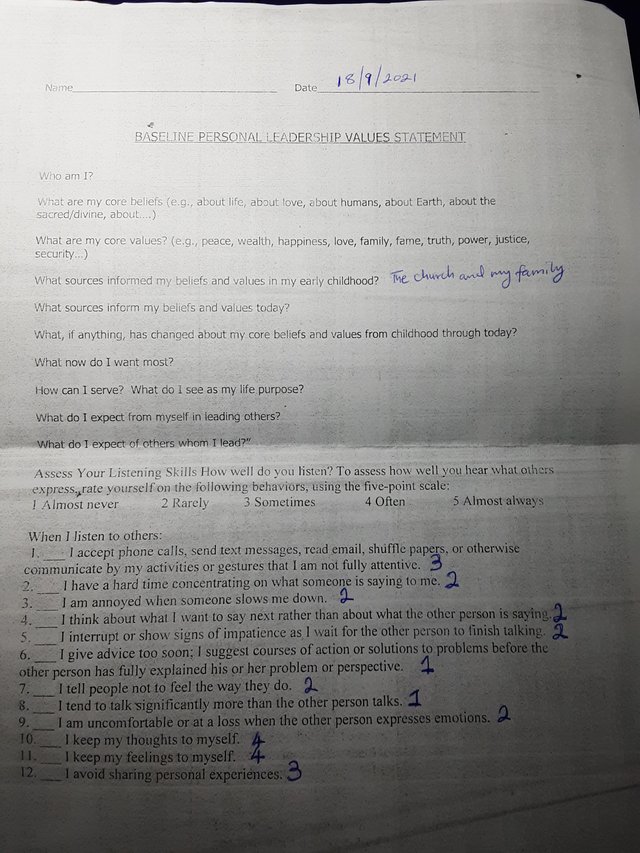
Today, I was privileged to attend a leadership retreat organized by the Federation of Catholic Medical and Dental Students(FECAMDS). A leader who is ignorant of certain basic facts about leadership may hit a dead end in the long run. I will share what we were taught today and I hope it helps Steemians who are leaders in our various locations become better leaders.
Early this morning, in a room filled with executives from various classes, I anticipated the symposium from the Friar as we waited patiently for his arrival. He entered and gave us an outline for his speech as follows:
OUTLINE
▪︎Baseline Personal Leadership Value Statement
▪︎The 4 Frames of Leadership
▪︎Ability to listen
BASELINE PERSONAL LEADERSHIP VALUE STATEMENT
He began by saying, "We all are broken, both the leader and the led. For a broken person to lead other broken people, it takes personal discovery and commitment"
According to the Friar, this section would help us look deep within ourselves and evaluate who we really are. We were given a questioneer to fill and the questions were indeed deeper than I thought.
Try to answer the questions on the picture before you proceed

THE 4 FRAMES OF LEADERSHIP:
The frames of leadership, according to him, are basically built on the strength and personality of an individual. The frame of leadership which you operate on determines how you lead, the means you employ to achieve the common goal of the group, the perception of your followers about you and in general, how you view the world at large.
The four frames of leadership are:
a) Symbolic frame
b) Political frame
c) Structural frame
d) Frame of human resources
The symbolic frame is represented by the human soul: Those who operate at this frame see the objective of leadership as making impact in the lives of others. They are concerned with upholding the shared belief of the group.
The Political frame is represented by the body: Those who operate at this frame see leadership as the use of power to achieve a certain goal
The Structural frame is represented by the mind: Those who operate at this frame see the objective of leadership as abiding to laid down rules and regulations, abiding to certain principles and policies etc. They are good a drafting laws and policies. Example: If the time for an event is 5pm and someone due to traffic or any reason at all arrived late, the person must be penalized notwithstanding. He then mentioned that being disciplined doesn't mean one should lack empathy, but it is not easy.
The Frame of Human Resources is represented by the human heart: Those who operate at this frame see leadership as attending to the needs of others. They are concerned with how the followers feel about them and they are good at creating and sustaining relationships within a group.
Read more
Depending on our various personalities and strengths, one frame could dominate the other but we should strive to operate at all frames in order to make us better leaders.
I then asked "How can one balance all the frames, what if you keep trying but it seems impossible. How do you cope?"
He answered using the Johari Window, see below
It encompasses things about yourself which is known:
a) only to you and not to others
b) only to others and not to you
c) neither to you nor to others
d) to both you and others
"You can achieve that by paying attention to the feedback from others through constructive criticisms, advice from trusted friends, superiors etc and by being sincere with one another. In that way, you will be aware of your shortcomings and be humble enough to accept them and work towards improvement", he concluded.
That ushered us into the next topic;
ABILITY TO LISTEN
"Good leaders are good listeners", he said. A leader should have the ability to listen to the unspoken words of the followers and be conscious enough not to overlook or trivialize the non-verbal cues from his followers. This is because we all are different; some can communicate their feelings or thoughts verbally while others prefer to communicate by keeping quiet. Thus, a good leader should be able to decipher when the silence or withdrawal of a member of the group could signify a problem.
I've personally experienced this. Being the FECAMDS president of my class, I noticed that one of the executives began to withdraw gradually. At first, we all thought it was just negligence and even though we frowned at it, we didn't make extra effort to truly know the reason. Due to school stress, we had to let the sleeping dog lie until one of us brought it up again and we decided to pay the person a visit. The outcome of that visit made me realize that I wasn't really paying good attention to non-verbal cues, and it thought me not to judge qiickly; though we all know that but do we actually practice it?...
It happened that the person was going through a lot of issues, both from home, her workplace, her friends... it was overwhelming. We all wondered why she didn't let us know all those while, but as we already established above, some people communicate better by keeping quiet (for reasons best known to them anyway. But in this case, just like many of us, she found it diffficult to share personal issues with others she doesn't know well). In the end, the visit really changed her view about us all and things got better subsequently. I realized that "A problem shared is a problem halved" wasn't fallacious afterall.
So if you're a leader out there, being a good listener will definitely make you a better leader.
In conclusion, he drew a line between Problems and Polarities. "Problems can be solved but polarities can only be managed",he said. As a leader, understanding that there are certain issues you can't solve will enable you work effectively by channeling your energy and resources into things worth saving or issues with actual solutions.
He gave instances using two roommates, one sleeps with the light on while the other sleeps only with the lights off and they both sleep at the same time, how do you resolve such an issue?... likewise in an organization, there's always a particular person who always disagrees with any suggestion the group agrees with, how do you deal with such a person?
But then one person asked, "when do you classify an issue as a problem or polarity? ... Won't it make the group grow lazy and dimnish their creativity as they will be too quick to term an actual problem, a polarity?".
I'll leave Steemians with the same question as well, "when do you classify an issue as a problem or a polarity"?
I will drop the answer he gave in the next 24hrs.
Meanwhile, as regards the questions you answered on listening skills in the picture above, if you had a 4 or 5, then you need serious improvement on that aspect. As you can see, I've gotta improve on my two 4s... LOL
For Steemians who wish to learn the piano, more posts on that are underway. Get your piano ready or download the piano app asap.
I hope this post helped you discover a part of yourself which you probably have not been paying attention to, but still affects your daily life. I wish you luck on your journey to becoming a better person, Steem on!
Cc;
@cryptokannon
@whitestallion
@campusconnectng
@ladyofpolicy
@sandrakez
.jpeg)
Within the structural frame you mention, it really bothers me when I go to a meeting, get there on time, then the person says, "We'll start in a couple minutes. We're waiting for more people to show up." In my opinion, that breeds no desire to show up on time. When I start a meeting, we start on time. People who show up late know that they must be to my meetings on time. At the same time, I do not go over the time on my meetings. If the information isn't given out during the time, I know we can schedule another meeting to discuss the matter. It's respect.
As for the 4's or 5's...sometimes the 1's are bad, too. Moderation in all things. As you explained in your story, sometimes you may find others are hurting. If you look at someone and believe they're going through something that's hard for them at the time, you'll probably be right 95% of the time. We all have issues we're dealing with. It's good you reached out. It's good you went to the training. As for problem/polarity, it depends on how strongly those beliefs are held and whether it matters for the issue at hand. If you are polar opposites in belief, but you can work together, that's polarity. If you can't work together because of those beliefs, that's a problem.
Downvoting a post can decrease pending rewards and make it less visible. Common reasons:
Submit
Wow!... thanks for your contribution, it is insightful.
Downvoting a post can decrease pending rewards and make it less visible. Common reasons:
Submit
This is brilliant...a wonderful leadership retreat indeed. I've learnt a lot from this post.
Downvoting a post can decrease pending rewards and make it less visible. Common reasons:
Submit
Thank you
Downvoting a post can decrease pending rewards and make it less visible. Common reasons:
Submit
Wow, this really inspired me after reading it, felt like it was talking to me, great work
Downvoting a post can decrease pending rewards and make it less visible. Common reasons:
Submit
Thank you. I'm glad it helped
Downvoting a post can decrease pending rewards and make it less visible. Common reasons:
Submit